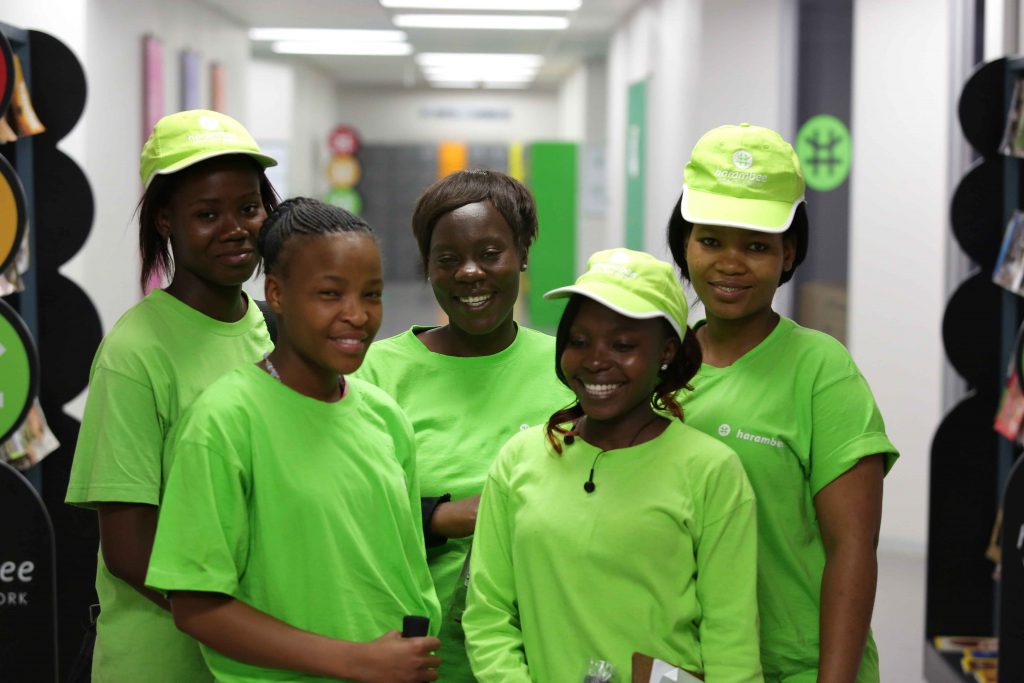CSI Sunday Times
Unlocking Opportunities For Youth Employment
Desperate solutions regarding unemployment, particularly youth unemployment are needed from government and business. Nobody can afford to be bystanders, everyone needs to contribute solutions.
A large chunk of the Social Development department’s R1.840-billion budget for the 2019/2020 financial year will go to social grant beneficiaries, but for the department’s minister, Lindiwe Zulu, supporting young entrepreneurs is also extremely important.
Business Unity South Africa (BUSA) has called on the government to develop specific, targeted interventions to enable greater job creation.
“We had very tough exchanges and we’ve been very frank that we don’t want to place issues on the table and then nothing happens,” BUSA president, Sipho Pityana, said recently at the Harambee Youth Employment Accelerator’s 6th Solutions Exchange for Youth Employment conference in Johannesburg.
Based in Johannesburg and with offices in Cape Town, Durban, Pretoria, Nelson Mandela Bay, East London and Kigali, Harambee is a nonprofit social enterprise that has extensive experience in South Africa and Rwanda building solutions geared at solving the global youth unemployment challenge. Harambee partners with business, government, young people and many others committed to results that can work at scale, using data, innovation, partnerships and on-the-ground experience to build practical solutions to the jobs crisis.
Harambee has connected over 100 000 unemployed youth with job opportunities at companies such as Barloworld, McDonald’s, Nandos, Standard Bank, Deloitte, Woolworths, Zara, Imperial, Microsoft, Hollard and Google.
It uses rigorous scientific matching tools and behavioural readiness programmes to reduce the hiring risk for employers by sourcing high-potential young people from a labour pool untapped by most employer networks. Potential employees are matched according to their skills and competencies and placed in jobs where they are most likely to succeed.
Harambee also works to fine-tune young job seekers’ interview skills to better identify a young person’s capability and potential to do the job properly, instead of focusing largely on previous work experience.
Bold action and innovative solutions needed
Also speaking at the Youth Employment conference, Minister of Employment and Labour Thulas Nxesi, said government was implementing a comprehensive plan that sought to address five key challenges over the next five years to unlock the energy and potential of young people. He said these included abolishing work experience as a requirement for entry-level posts in the public service and an expanded National Youth Service.
“The scale of youth unemployment requires bold and urgent action. It requires innovative solutions, extraordinary effort, deep collaboration between the public and private sectors, and decisive measures,” Nxesi said.
SA SME Fund
One of the country’s major public-private jobs partnerships is the SA SME Fund, an initiative borne out of the “CEO Initiative”, a partnership between the South African government, labour and business to stimulate the economy and create jobs. Set up in 2016, the shareholders of the fund are 50 of South Africa’s largest corporates and the Public Investment Corporation.
The fund has R1.2-billion of investable capital, which it invests via partnerships with fund managers, with over R725-million already committed to existing projects.
A recent development was the SA SME Fund and government’s Technology Innovation Agency (TIA) announcement of a public-private partnership to co-invest R350-million across three tech-focused venture capital funds: Savant Venture Fund, a hardware technology incubator and fund manager (in which two deals have already been pre-funded by TIA’s Seed Fund); the newly-established University Technology Fund (UTF); and OneBioSeed Investment Fund, a biotechnology-dedicated fund.
Savant is a commercially-focused hardware technology incubator and fund that provides bespoke business development support to start-ups with a focus on inventions rooted in innovative science and engineering technologies. OneBio’s vision is to stimulate biotech innovation and economic growth in Africa and the University Technology Fund aims to support the commercialisation of intellectual property developed at local tertiary institutions.
These fund managers will invest in a portfolio of early-stage businesses and provide capital as well as other support to entrepreneurs to help them commercialise technologies and grow their businesses. The SA SME Fund’s mandate to the three fund managers includes a requirement that they invest at least 50 per cent of the fund into businesses owned by black entrepreneurs.
“We are excited and energised by this partnership to support and invest in innovation, especially in black-owned start-ups and scale-ups in this space. This forms part of our commitment to stimulate and intensify technological innovation to improve economic growth, create jobs and impact on the quality of life of all South Africans,” said the CEO of the SA SME Fund, Ketso Gordhan, when the initiative was first announced.
At the launch of the SA SME Fund earlier this year, President Cyril Ramaphosa said: “This initiative is beginning to pay off and is operating at a level that matters most. SMEs create the jobs we need the most. Mixing funding with mentoring and incubation is the right approach to growing black-owned businesses.”
The Jobs Fund
Another government-led initiative, the Jobs Fund, was set up as a presidential project in 2011 to co-finance projects by public, private and non-governmental organisations that will significantly contribute to job creation. This involves the use of public money to stimulate innovation and investment on behalf of a range of economic stakeholders in South Africa. It is designed to provide public funding through four “funding windows”: enterprise development; infrastructure investment; support for work seekers; and institutional capacity building. Through the implementation of various projects, the Jobs Fund has learnt that the more closely enterprise development support is customised and tailored to the needs of the business’ target market, the more successful it is likely to be.
In 2013, the Jobs Fund granted Black Umbrella’s Pretoria incubator R13.5-million to help develop 100 per cent black-owned businesses by facilitating access to markets, finance and business networks. Among the beneficiaries is Promise Machimane, the founder of Mia Sanitary Towels.
Incubator programmes
Machimane founded the company in 2012 with the vision of assisting women and girls from previously disadvantaged rural communities to access low-cost, high-quality sanitary pads.
In February 2017, she joined the BU incubator and was paired with a mentor who gave her practical advice on how to implement new strategies and procedures to improve and ultimately grow her business. Machimane has since made several changes to her business, including installing an accounting system, improving human resource management by putting together job descriptions for all her employees, and drawing up a business plan that she being rolled out.
Before she joined the BU incubator, her company operated out of a house with 17 employees. By the end of 2018, Mia Sanitary Towels had grown to 24 employees with larger premises. In 2018, the company distributed over 700 000 packets of sanitary towels and recorded an annual turnover of around R2-million. It has seven distributors throughout the country, which in turn employ 72 agents to sell Mia Sanitary Towels’ products. Machimane’s expansion plan includes establishing franchises across the country to increase her penetration into larger retail markets.
Creating jobs
Through all the nation’s struggles, football is one salvation, and what better way to create jobs than through the beautiful game, which is exactly what the fast-growing Fives Futbol business is achieving. Originally operating from a single Cape Town site, Fives has now grown to 18 football centres countrywide. “We employ over 50 full-time and 100 part-time staff. That we are creating jobs through a sport people love, is something we’re very proud of. Another facet is the creation of microentrepreneurs through subleases for cafes, junior coaching programmes, physios and even a retail outlet,” says Fives CEO, Adam Fine.
Fives currently operates across five provinces and aims to be present in seven provinces and to open 25 sites by 2020. “We still need to do more, create more employment opportunities, better access for more aspiring footballers and to act more frequently as a platform for more NGOs doing fantastic work,” Fine adds.
The odds seem insurmountable, as jobs continue to be scarce and the economy remains stagnant, but there can be no letting up while so much more needs to be done.






 Sign-up and receive the Business Media MAGS newsletter OR SA Mining newsletter straight to your inbox.
Sign-up and receive the Business Media MAGS newsletter OR SA Mining newsletter straight to your inbox.